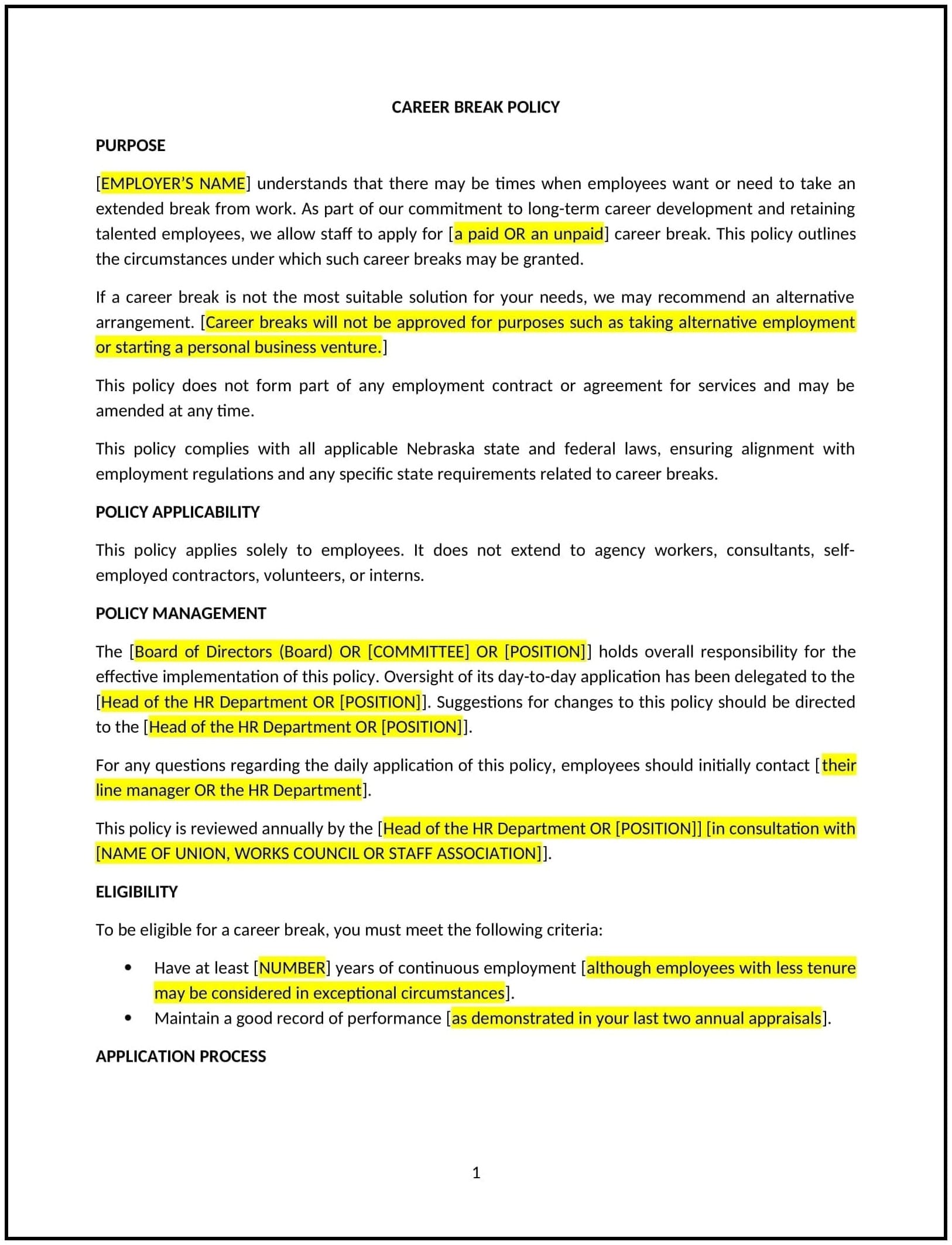Got contracts to review? While you're here for policies, let Cobrief make contract review effortless—start your free review now.

Customize this template for free
Career break policy (Nebraska)
A career break policy helps Nebraska businesses offer employees the option to take an extended leave from work for personal, educational, or professional reasons. This policy outlines the eligibility criteria, the process for requesting a career break, the duration of the break, and the expectations regarding the employee's position during the leave period. It is designed to support employees in pursuing personal or professional goals while maintaining a positive relationship with the company.
By adopting this policy, businesses in Nebraska can retain talented employees, provide work-life balance options, and create a more flexible and supportive work environment.
How to use this career break policy (Nebraska)
- Define eligibility criteria: Specify who is eligible for a career break, such as full-time employees with a certain tenure, and any requirements that need to be met for approval.
- Set the duration of the career break: Outline how long employees can take for a career break, whether it's for a few months or up to a year, and the process for requesting an extension, if necessary.
- Clarify the purpose of the break: Indicate the types of activities that qualify for a career break, such as pursuing education, personal development, family care, or volunteer work.
- Address compensation and benefits: Specify whether the employee will receive compensation during the break, and outline how benefits (e.g., health insurance, paid time off) will be handled during the leave period.
- Establish the process for requesting and approving a career break: Provide a clear, formal process for submitting requests, including the necessary documentation, and the time frame for approval.
- Address job security: Outline whether the employee’s position will be held during the career break, and if not, what alternatives or reassignment options are available.
- Communicate the policy: Ensure employees are aware of the career break policy, including details about eligibility, how to apply, and the implications for their role and benefits.
- Review and update: Periodically review and update the policy to ensure it reflects changes in Nebraska laws, business needs, or evolving employee expectations.
Benefits of using this career break policy (Nebraska)
This policy provides several benefits for Nebraska businesses:
- Supports employee well-being: A career break can help employees manage personal matters, pursue further education, or rejuvenate, leading to improved job satisfaction and mental health.
- Enhances employee retention: Offering career breaks helps businesses retain employees by providing them with the flexibility to take time off while still having a pathway back into the company after their break.
- Promotes work-life balance: Providing career breaks demonstrates a commitment to work-life balance, helping to attract and retain talent that values flexibility.
- Reduces burnout: Allowing employees to take extended breaks can prevent burnout and increase long-term productivity and engagement when they return.
- Strengthens employer brand: A career break policy contributes to a positive employer reputation, positioning the business as supportive and progressive, which is appealing to potential employees.
Tips for using this career break policy (Nebraska)
- Communicate the policy clearly: Ensure that all employees are informed about the availability of career breaks, the process for requesting one, and the implications for their job and benefits.
- Encourage early planning: Ask employees to plan their career breaks well in advance, giving the company time to manage staffing and workload during the employee’s absence.
- Be flexible: While maintaining clear guidelines, offer flexibility in the reasons for taking a career break and how the break is structured, recognizing that employees may need different types of time off for various personal or professional goals.
- Document the terms: Keep clear records of career break requests, approval processes, and any changes to job responsibilities or compensation during the leave period.
- Monitor policy effectiveness: Regularly review the policy to ensure it meets employee needs, aligns with Nebraska labor laws, and reflects the company’s evolving goals.